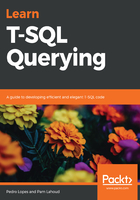
About the authors
Pedro Lopes is a Program Manager in the Database Systems group, based in Redmond, WA, USA. He has over 19 years of industry experience and has been with Microsoft for 9 years. He is currently responsible for program management of Database Engine features for in-market and vNext versions of SQL Server, with a special focus on the Relational Engine. He has extensive experience with query performance troubleshooting and is a regular speaker at numerous conferences such as SQLBits, PASS Summit, SQLIntersection, Microsoft Ignite, and Microsoft Build. He blogs about SQL on the SQL Server Team blog. He has authored several tools in the Tiger toolbox on GitHub: AdaptiveIndexDefrag maintenance solution, BPCheck, and usp_WhatsUp.
Pam Lahoud is a Program Manager in the Database Systems group, based in Redmond, WA, USA. She has been with Microsoft for 13 years and is currently responsible for program management of Database Engine features for in-market and vNext versions of SQL Server, with a special focus on the Storage Engine area. She is passionate about SQL Server performance and has focused on performance tuning and optimization, particularly from the developer's perspective, throughout her career. She is a SQL Server 2008 Microsoft Certified Master (MCM) with over 20 years of experience working with SQL Server.